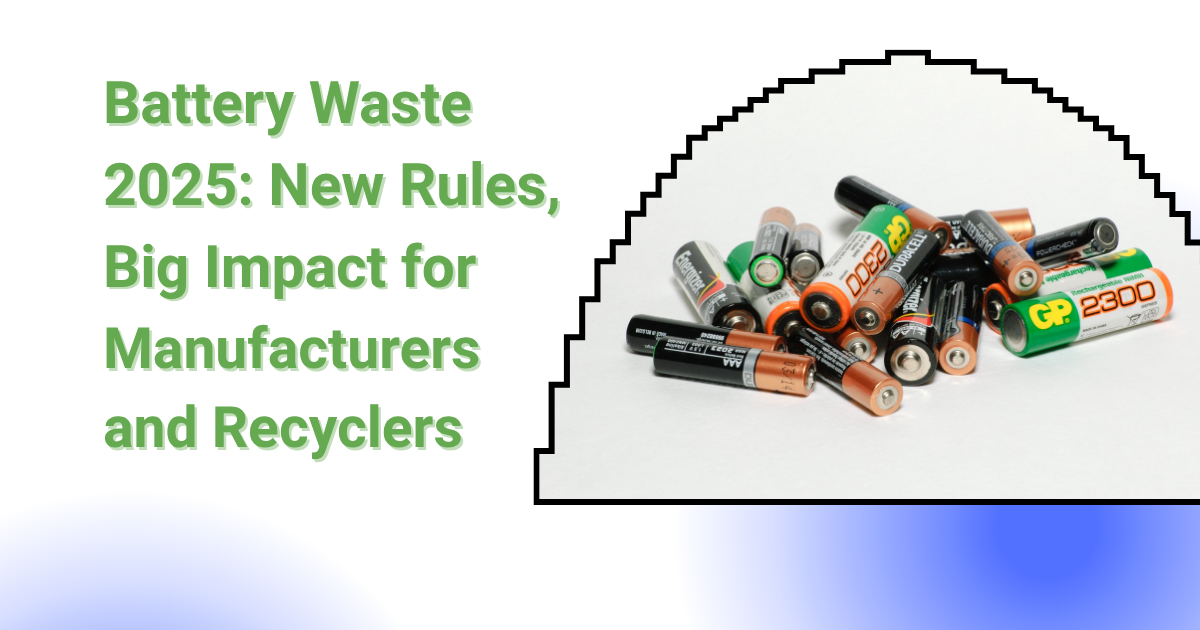Battery Waste 2025: New Rules, Big Impact for Manufacturers and Recyclers
Batteries have become increasingly popular in India due to the country's quick transition to electric vehicles, portable devices, and renewable energy sources. However, this has also brought with it the problem of managing battery trash.
The Battery Waste Management Amendment Rules 2025 mark a major regulatory step toward ensuring that battery waste is properly collected, recycled, and disposed of, aligning with global sustainability goals and protecting India’s environment.
The 2025 Battery Waste Management Regulations: What Are They?
The Ministry of Environment, Forests, and Climate Change (MoEFCC) of India has updated the 2022 framework with the Battery Waste Management Rules 2025.
The purpose of these guidelines is to:
✅ Ensure responsible collection, recycling, and reuse of used batteries
✅ Reduce the environmental impact of hazardous battery waste disposal
✅ Promote a circular economy approach where recovered materials feed back into the supply chain
The Extended Producer Responsibility (EPR) for battery waste management is one of the main tenets of the regulations. It makes manufacturers, importers, and brand owners accountable for recovering and properly handling the batteries they release onto the market.
Who Needs to Comply?
- Battery manufacturers
- Importers and brand owners
- Bulk consumers (large enterprises using batteries at scale)
- Recyclers and refurbishers
The waste management system requires all of these stakeholders to register on the centralized site, monitor battery flows, achieve collection goals, and provide yearly reports.
Key Compliance Requirements
EPR Obligations: Producers must ensure that a set percentage of batteries sold are collected and recycled each year.
Battery Recycling Standards: Recyclers must meet stringent recovery and material reuse benchmarks, ensuring that critical materials like lithium, cobalt, nickel, and lead are extracted and fed back into the system.
Eco-friendly Battery Waste Disposal: Improper disposal, including landfilling or incineration, is strictly prohibited under the 2025 rules.
Online Tracking & Reporting: All stakeholders must report their battery flows through the online EPR portal, making the process transparent and traceable.
Why the 2025 Rules Matter
The Battery Waste Management Rules 2025 are a game-changer:
- They reduce toxic leakage into soil and water
- They support the circular economy by maximizing material recovery
- They push manufacturers to rethink battery design for sustainability
- They create new business opportunities in the battery recycling sector
Final Thoughts
With the 2025 amendment guidelines, India is enforcing stricter battery waste management regulations, but the goal is to create a sustainable, forward-thinking sector.
It is now a competitive benefit for producers, importers, recyclers, and big users to remain ahead of compliance. Market leadership and customer confidence will go to those that make early investments in effective battery recycling procedures, strong take-back initiatives, and open EPR battery waste management systems.
Also Read: https://www.corpseed.com/service/hazardous-waste-management-authorization

Comments